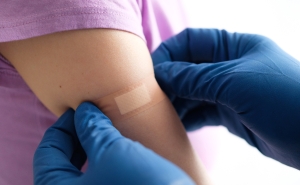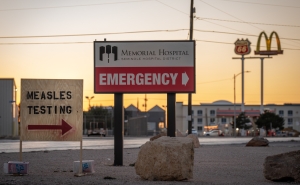
Interview by Stephanie Desmon
For many immunocompromised patients, the regular two-dose COVID-19 vaccine regimen—and in some cases, even a third dose—didn't provide sufficient immune protection. As a result, approximately 5 to 7 million immunocompromised people living in the U.S. have been struggling for over a year with how they will achieve vaccine-induced immunity.
In this Q&A, adapted from the January 14 episode of Public Health On Call, Dorry Segev, MD, PhD ’09, MHS ’09, professor of Surgery at the Johns Hopkins School of Medicine and professor of Epidemiology at the Bloomberg School, talks with Stephanie Desmon about his studies with immunocompromised patients and COVID-19 vaccination throughout the pandemic—and why he thinks an individualized approach is needed for this population.
Where are we right now in terms of dose regimens for immunocompromised people?
When the vaccines came out, no one knew how immunocompromised people would respond to them. They were excluded from the big clinical randomized trials. Very early on, we started to measure antibody levels in people who are immunocompromised after one dose, after two doses—and it was very clear that the more immunocompromised you were, the lower your immune response to the vaccine. Two shots for many people who are immunocompromised was grossly inadequate. There was a good response to a third shot.
I care for transplant patients who take immunosuppression [drugs] to prevent their [transplanted] organs from rejecting, but that suppresses their immune system response to vaccines as well. In transplant patients, even with three shots in the currently recommended regimen, about half of transplant patients don't reach a level of an antibody that correlates with clinical protection.
So, they might as well be unvaccinated as far as how protected they are?
It's likely that there's some protection with regard to the severity of their disease. The fact that people with no antibody after two shots do sometimes demonstrate a lot of antibodies after three shows us that each dose primes the immune system. We're measuring antibodies and neutralizing antibodies, but there are also memory B cells and T cells, which we don't really have good ways of quantifying or correlating with protection.
I would say it's absolutely critical for anyone who’s immunocompromised to get vaccinated. Even if they don't have a lot of detectable antibodies, they likely have some amount of protection. They're still at risk of acquiring the disease at a higher rate with more severe infection than people who are immunocompetent, although maybe not as severe as if they had not been vaccinated at all.
There are two dimensions to protection: One is, can we prevent you from getting COVID at all? The second is if you should get it, can we minimize disease severity?
Public Health On Call
This Q& A adapted from the January 14 episode of Public Health On Call Podcast.
How can we protect those who are immunocompromised?
We're doing two things. First, we're working on the vaccine aspect. We got NIH funding to run a clinical trial of people who thus far have failed to reach a reasonable antibody level with whatever vaccine regimen they've gotten. We give them another dose and [then] we randomize them to either just getting that dose alone, or getting that dose plus reduction of their immunosuppression [medication]. We're running a national randomized trial; there are a number of centers currently enrolling patients. We're trying to better figure out the vaccine side so that ideally, anyone who could get vaccine immunity should take that road because [immunity from vaccination] is so broad-based with antibodies, memory B cells, T cells, etc.
The other aspect we’re working on is passive immunity, such as giving someone monoclonal antibodies to get the antibody-mediated protection. They don't get the rest of the B cell and T cell immunity, but they get so much neutralizing capability from these monoclonal antibodies that it does give them some protection. The question is, how durable is that protection?
As we know, recently a lot of studies have been coming out looking at the monoclonal antibodies and their activity against omicron. Why is it that some monoclonals don't work well against omicron, but vaccine-induced immunity does work reasonably well against omicron? Again, it's that broad base of immunity you get from active immunity versus passive immunity, but we're pursuing both roads to try to optimize the immune protection of people who are immunocompromised.
If I were immunocompromised, and I had three shots, what would you recommend I do?
One of the big issues thus far, much to my disappointment, is that FDA, CDC, and even a lot of professional societies have recommended against antibody testing. Historically, the antibody testing platforms were not great. We didn't have evidence correlating antibody levels [to protection].
We know from large studies that at least in people who are immunocompetent, higher antibody levels directly correlate with clinical protection. In those with normal immune systems, T cell responses, B cell responses, [and] antibody responses all work in synchrony. That synchrony might be broken in, for example, the transplant patient who is on T cell inhibitors.
However, antibody testing does provide some information. For example, if an immunocompromised person has had three doses, and their antibody levels are low, I would say that in all likelihood they are not protected and need to be incredibly careful. If their antibody levels are very high, there still might be less protection than in someone with a normal immune system, because their T cell response might be suboptimal. But at least they have a sense of this when they make risk-benefit decisions about their lives. If they have to go to work, if they have to interact with people, at least they have a sense of where their protection might be.
How easy is it for someone to get a fourth dose? Is it complicated?
Another frustration of mine is the one-size-fits-all FDA and CDC recommendations. They're not individualized; they don't give doctors the ability to individualize care.
For example, if one of my patients got three doses, and they ended up with a relatively low but still positive antibody, I would want to give them a fourth dose to boost them higher. I can't do that because [doses] are limited. Unless it's been six months since they had their third dose, I'm not allowed to give them a fourth dose, which is very frustrating. I can give someone a fourth dose in our clinical trial, but in regular practice, basically every medical provider who cares for immunocompromised people is limited.
We have third doses, fourth doses, immunosuppression reduction—everyone needs an individualized approach. We are in a nation that is celebrating personalized medicine, yet, this is as impersonal as it can be. I think that's problematic. I think we need to put this back into the hands of the medical providers who know these patients and who can help them make these decisions.
Transplant patients are doing this on their own. There have been a number of media reports about people saying, “I need to get protected. I'm going to go and get the doses that I need.”
So some people just go out and are experimenting on themselves?
I would love to see this done in a data-driven manner, where we know where they stand in terms of their antibody responses, we know what immunosuppression [drugs] they take, their doctors know what their immune system looks like, and they make personalized decisions for them.
We're building the plane as we fly it, and we need to give medical providers across the United States some control over where the plane goes for their individual patients. Right now, we don't have that.
How close do you think we are to that? Are we so concerned about public health as a whole, that we don't have space to think about these immunocompromised people?
I don't think it’s the concern of vaccine dose availability that is stifling the FDA and CDC guidelines. I think they are focused on safety. But at this point, we know it's safe. We have plenty of data to say, “Look, this really needs to be individualized.”
Israel is already doing fourth doses and has been doing them in immunocompromised people for a long time. The CDC and FDA guidelines can't be a complex decision tree of, “Did you have three doses? Was your antibody level less than 250? If it was, are you taking MMS [an immunosuppressive drug]? If it wasn’t, then you should get a fourth dose, but it should be at four months, where this person should get a fourth dose at two months.”
That's too complicated for a big government agency, but that is what doctors do. That's what medical providers do: They individualize care for their patients. For any other medication I give my patients, I have the permission to [individualize care]. For vaccines, we don't have permission.
Stephanie Desmon is the co-host of the Public Health On Call podcast. She is the director of public relations and marketing for the Johns Hopkins Center for Communication Programs, the largest center at the Johns Hopkins Bloomberg School of Public Health.





